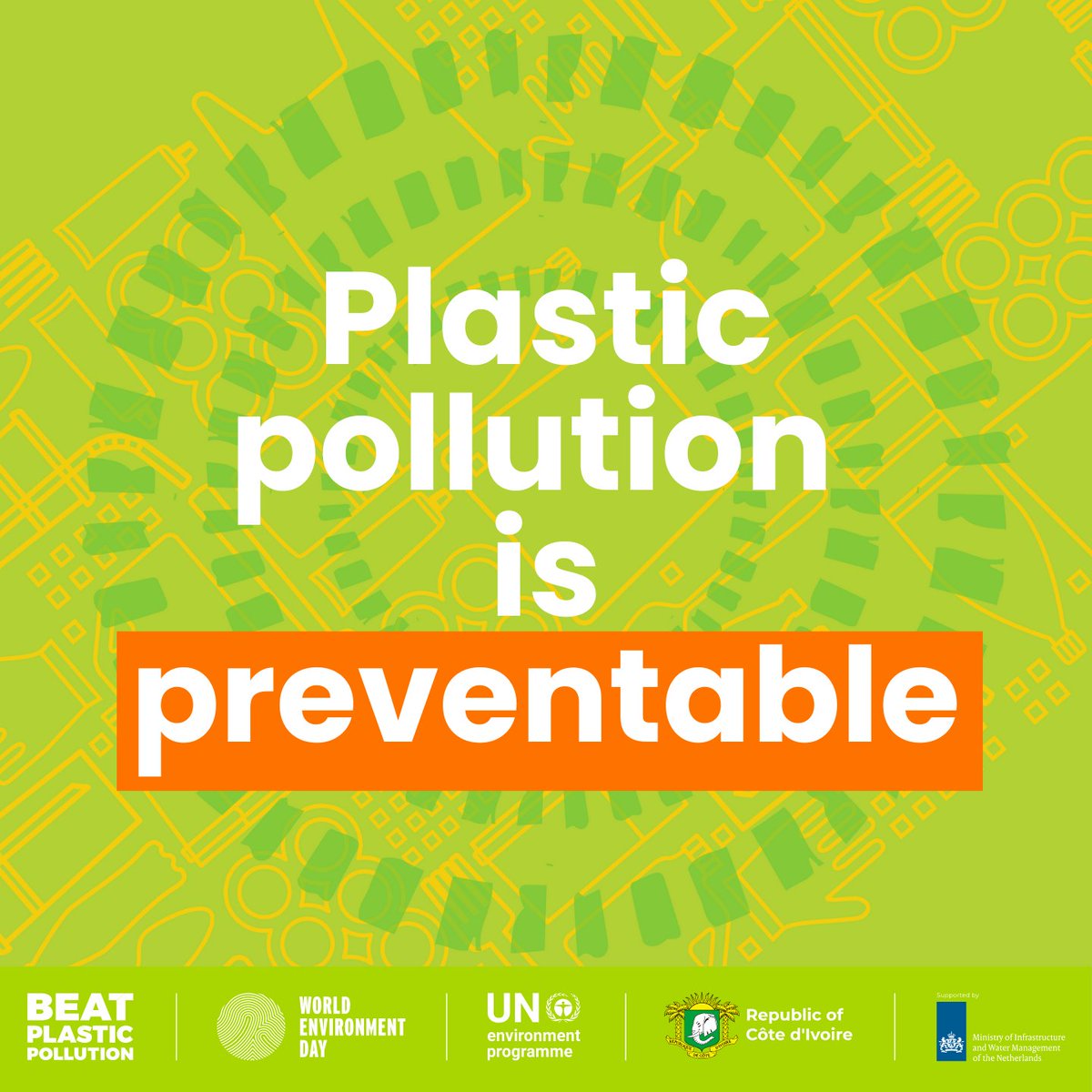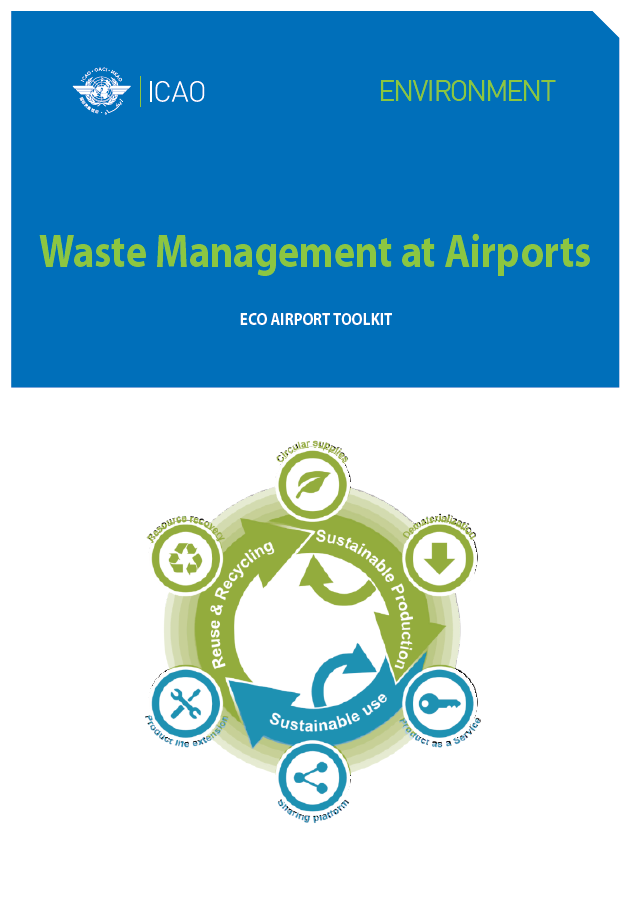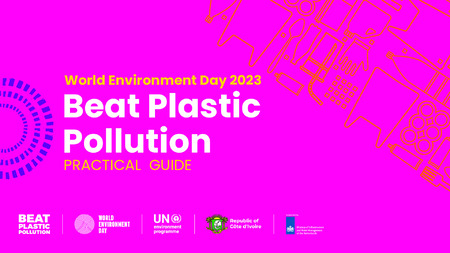Led by the United Nations Environment Programme (UNEP), World Environment Day has become one of the largest global platforms for environmental outreach and is celebrated by millions around the world every June 5th. This year’s World Environment Day 2023 is being hosted by Côte d’Ivoire with the support of the Netherlands, will focus on solutions to plastic pollution.
The rapid increase in the production of plastic products threatens to exceed the world’s capacity to manage and dispose of these materials. It is one of the most pressing environmental issues.
To give some perspective, plastic production increased from two million metric tons (Mt) in 1950 to an estimated 380 million Mt in 2015, a compound annual growth rate of 8.4%. The Great Pacific Garbage Patch, as an example, is the largest accumulation of ocean plastics in the world and is now twice the size of Texas, and four times the size of Japan or Germany.
Plastics are largely derived from fossil fuels and continue to emit greenhouse gases (GHGs) at each stage of their life cycle, from extraction to production, up to and including their end-of-life. The increase of plastic production is estimated to have emitted over 56 billion Mt of carbon dioxide equivalent (CO2e) between 2015 and 2050, which is 10–13% of the entire remaining carbon budget.
The 2023 World Environment Day campaign #BeatPlasticPollution calls for global solutions to solve the plastic pollution crisis and serves as a reminder for how we can all be part of the global movement.
Actions from all sectors and stakeholders are required to ensure a transition to a less plastic-dependent economy by eliminating and substituting unnecessary and hazardous plastic production and packaging, especially single-use plastics (SUP). The aviation sector, which, while striving towards decarbonization and continuing its path towards sustainable operations, can also address plastic pollution. Today, ICAO is answering the call to join the global campaign to #BeatPlasticPollution.
Aviation and single-use plastics
From plastic cups and cutlery to packaging materials and amenity kits, the aviation sector generates a considerable amount of plastic waste, making the use of SUP, a growing concern in the aviation industry.
 Airports and airlines are already actively working towards reducing the use of SUP within their operations. Airports are exploring solutions that include the installation of water stations to refill reusable bottles, implementing recycling programmes, and collaborating with concessionaires to limit the use of plastic packaging. They are also engaging with passengers through awareness campaigns to promote responsible plastic consumption and waste management.
Airports and airlines are already actively working towards reducing the use of SUP within their operations. Airports are exploring solutions that include the installation of water stations to refill reusable bottles, implementing recycling programmes, and collaborating with concessionaires to limit the use of plastic packaging. They are also engaging with passengers through awareness campaigns to promote responsible plastic consumption and waste management.
Some of the initiatives by the airlines include replacing plastic cutlery and stirrers with sustainable alternatives, implementing recycling programmess on board, and reducing the packaging of in-flight amenities. Some airlines have also introduced biodegradable or compostable alternatives for items like food containers and cups.
In spite of these measures, there are still obstacles with SUP use that aviation stakeholders have to address. As plastic products are used throughout different levels of jurisdictions, their usage and disposal are subject to different regulations, which may not always be harmonized:
- Though SUP regulations can be implemented in airports and at national levels, it can be challenging when airlines are required to comply with various restrictions on the use of SUPs that are adopted at the airport of departure and those adopted at the airport of arrival in another State.
- The replacement of SUP with alternative single-use items (including biodegradable crockery and cutlery produced to be re-used, recycled or biotreated) is also not possible in cases where applicable regulations require international catering waste to be disposed of by incineration or in an authorized landfill.
- Some security regulations impose the use of certain SUP products, including plastic bags for liquids, aerosols, and gels and for duty-free products.
- Finally, given the lightweight benefits of plastic, it is essential to take into account transport-related emissions on a lifecycle basis when considering regulation aimed at replacing SUP with reusable products on aircraft, in order to avoid possible increases in CO2
ICAO’s work against plastic pollution
The global fight against plastic pollution is connected with several ICAO environmental initiatives, such as the promotion of sustainable airlines and airports operations, aircraft end-of-life and recycling, and the integration of a circular economy in international aviation.

ICAO plays a crucial role in facilitating global dialogue, knowledge exchange, and the development of harmonized policies, standards, and guidance to promote a level playing field for the industry. We also are committed to advancing comprehensive and effective measures to address aviation’s environmental impacts worldwide. Collaborative initiatives led by ICAO could also help establish coherent frameworks, promote best practices, and encourage States to align their approaches to minimize the environmental impact of SUP.
One example of this builds on the comprehensive series of e-publications known as the Eco-Airport Toolkit. ICAO Council’s Committee on Aviation Environmental Protection (CAEP) is currently developing a new Eco Airport Toolkit e-publication that specifically covers SUP.
are a series of e-publications that provide comprehensive guidance and resources on environmental best practices for airports. These toolkits are designed to assist airport operators, aviation authorities and other stakeholders in implementing sustainable measures and improving environmental performance in airport operations.
The toolkits already cover a wide range of environmental topics relevant to airports, including greenhouse gas management, air quality, renewable energy, waste management, water management, and climate resiliency, and will soon cover the topic of SUP. This new e-publication on SUP will aim to increase public awareness and address the issues caused by SUP in the aviation industry through the use of appropriate case studies and best practices to support global action.
Circular economy for aviation
While ICAO recognizes the vital importance of addressing SUP, this is a global issue that transcends different jurisdictions of regulations so coordinated cooperation from all sectors and type of stakeholders is needed to be able to align efforts in tackling plastic pollution.
The airline industry stands ready to tackle the challenge of replacing SUP with more sustainable alternative inflight products and is calling for symmetric SUP regulations among stakeholders.
Under the Global Tourism Plastics Initiative, the global tourism sector is also rallying behind a common vision to address plastic pollution in its activities. Led by UNEP and the World Tourism Organization (UNWTO), in collaboration with the Ellen MacArthur Foundation, the Global Tourism Plastic Initiative enables governments, organizations, businesses and other tourism stakeholders to take concerted action through a systemic approach in the shift towards circularity in the use of plastics.
The strong linkage between plastic pollution and circular economy was highlighted recently by UNEP with its release, on 16 May 2023, of the Turning off the Tap Report: How the world can end plastic pollution and create a circular economy.
The report addresses how the world can globally beat plastic pollution by accelerating three key shifts – reuse, recycle, and reorient and diversify – of the concept of circular economy, which forms an integral part of the United Nations’ Sustainable Development Goals.
For the aviation sector, circular economy is an emerging concept and has potential to reshape the whole supply chain from product design (aircrafts, flights and aerodromes) to end-of-life management. Manufacturers, airlines and airports are already involved in the growing movement, with more expected to join in the future. Numerous opportunities exist, such as reusing and recycling end-of-life aircraft materials, reducing and valorizing waste during flights and in ground infrastructures (food, packaging, municipal solid waste, construction and demolition debris), reducing energy, water and raw material consumption.
For detailed examples of the application of the circular economy in international aviation, Chapter 8 “Towards a Circular Economy” of the 2019 ICAO Environment Report provides the following insight:
- An introduction to circular economy
- Circular Economy at Amsterdam Airport Schiphol
- London Gatwick’s Circular System for Becoming a Zero Waste Airport
- Best Practices and Standards in Aircraft End-of-Life and Recycling
Next steps: ICAO’s contribution to UNEP’s process against plastic pollution
As part of the United Nations system, ICAO cooperates with more than 50 UN entities on all matters related to international aviation and the environment.
 ICAO is also committed to its participation in the implementation of the 2030 Agenda for Sustainable Development, which benefits from enhanced and strengthened partnerships with UN system organizations. This of course includes UNEP, whose efforts and initiatives focus on topics that are central to ICAO’s work on environmental protection.
ICAO is also committed to its participation in the implementation of the 2030 Agenda for Sustainable Development, which benefits from enhanced and strengthened partnerships with UN system organizations. This of course includes UNEP, whose efforts and initiatives focus on topics that are central to ICAO’s work on environmental protection.
In a historic decision at the fifth United Nations Environment Assembly (UNEA) in March 2022, all 193 UN Member States decided on the need for a global agreement to end plastic pollution by the end of 2024.
In her speech the Executive Director of UNEP, Ms. Inger Andersen, noted that the adoption of Resolution UNEA 5/14 “marks a triumph by planet earth over single-use plastics…in parallel to negotiations over an international binding agreement, UNEP will work with any willing government and business across the value chain to shift away from single-use plastics, as well as to mobilize private finance and remove barriers to investments in research and in a new circular economy.”
In resolution 5/14, UNEA requested the convening of an Intergovernmental Negotiating Committee (INC) to develop an international legally binding instrument on plastic pollution, including in the marine environment, based on a comprehensive approach that addresses the full life cycle of plastic. The first meeting of the INC took place in Uruguay in December 2022 while the second meeting of the INC took place in Paris from 29 May to 2 June 2023.
ICAO welcomes the historic milestone reached at the UNEA and is joining the INC as an observer, to monitor the developments of the ongoing negotiations on plastic pollution and contribute to this process.

